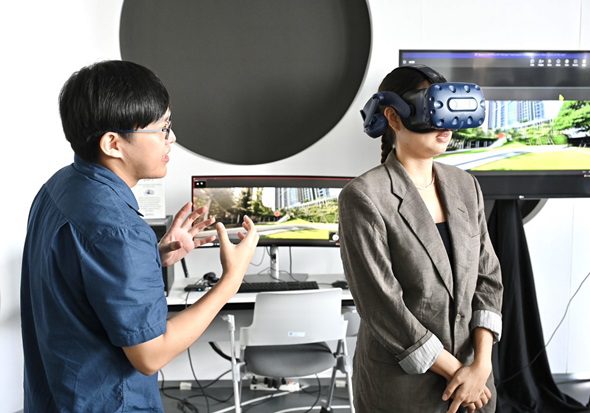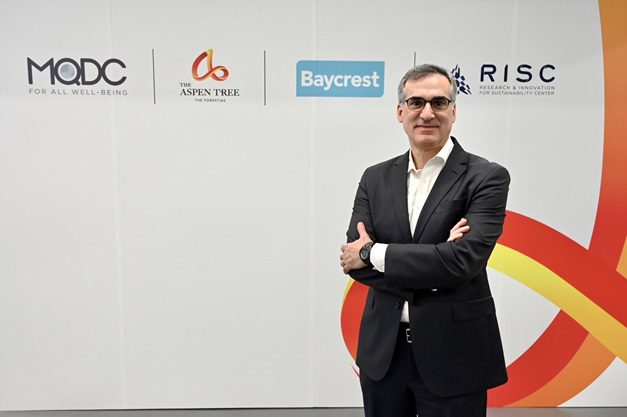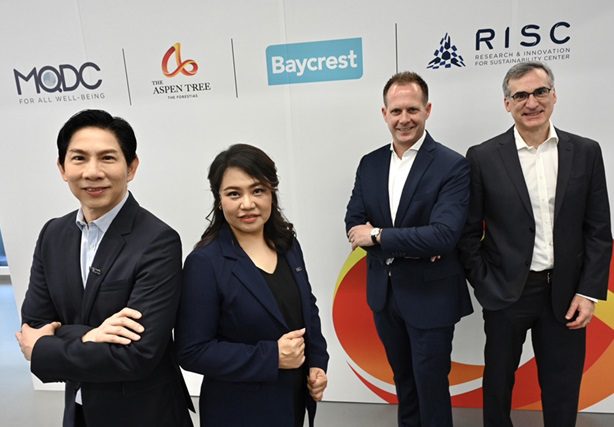The cooperation aims to promote a new body of knowledge on brain health and happiness science, which will help improve residential projects for people aged 50+ and directly address the arrival of a super-aged society.
The Aspen Tree has observed the steady growth of the aged population around the world, including Thailand. It has therefore developed a residential project, especially for this group of customers, with the aim of becoming the world’s first such project to provide holistic  lifetime care and promote physical, mental, brain and social health. With this goal in mind, The Aspen Tree has been working with research centres and geriatric science specialists to develop the project from the blueprint stage to after-sales services to better serve this group with specific needs.
lifetime care and promote physical, mental, brain and social health. With this goal in mind, The Aspen Tree has been working with research centres and geriatric science specialists to develop the project from the blueprint stage to after-sales services to better serve this group with specific needs.
“Senior citizens are critical. They form the majority of our society and have a lot of experience, expertise, knowledge, and energy. Many are still very active and can contribute a lot to the economy and society. If we can help them live the life they dream of, we are not only making them happy but also supporting comprehensive social development. The Aspen Tree is glad to work with the Happiness Science Hub by RISC and Baycrest and be the sandbox for innovators. We hope our project will be the happy home for long-term life planners and future innovation development,” Mr Toivanen said.
“Innovations from the Happiness Science Hub will be first implemented in The Aspen Tree because the project was initially developed to create sustainable physical and mental health for the residents. More importantly, The Aspen Tree targets 50+ residents, making it the perfect place for these innovations to be introduced. In the future, we hope to bring new knowledge and discoveries as well as innovations to the general public. This, we believe, will support further innovation development and application,” said Dr Sarigga.
“Happiness Science Hub is the study of behaviours and psychology of people of all ages, the human sensory system, brain signals and scientific tools that create or promote positive feelings and mental well-being. This study will enable us to understand physical and psychological deterioration in seniors. With a deep understanding of such factors, scientists will be able to find ways to reduce or slow down the occurrence of some significant symptoms and diseases, such as dementia and Alzheimer’s. In addition, scientists will be able to understand factors that promote happiness, thus ensuring the all-around contentment of people of different ages. This is a new science about which knowledge is still limited and thus requires further study.”
Dr Sarigga added, “Happiness science research can be applied to the planning and development of homes, cities and the environment to promote sustainable living. The cooperation among the three partners and the synergy of different expertise will attract more researchers and experts to join forces to study and make discoveries about our brains and happiness-promoting factors.”
In carrying out this research and to support further innovation development, RISC will be working with researchers, innovators, experts and partners in many fields, including the Brain-computer Interface Lab (BCI) of the Faculty of Biomedical Engineering Department under the Faculty of Engineering, Mahidol University, the Institute for Technology and Innovation Management, Mahidol University, the Neuroscience Center for Research and Innovation of King Mongkut University of Technology Thonburi, Chulalongkorn Hospital’s Neuroscience Research Center, and Srinakarinwirot University’s Behavioral Science Research Institute.
 Department of Family and Community Medicine.
Department of Family and Community Medicine.
“Baycrest’s experience and expertise in geriatric care is unmatched on the global stage. We look forward to seeing our more than 105-year history of excellence in care, innovation and research have positive impacts on Thailand’s ageing population, solidifying the Aspen Tree as an unprecedented example for other communities aimed at older adults.”
“With the cooperation with RISC and The Aspen Tree, we will together develop Cogniciti in the Thai language, which will be our third language. This will be very helpful for people to initially learn about the health of their brains,” Dr Feldman added.
Reports from Statista forecast that the global aged population will grow from 20-30% of the entire global population in 2020 to 30-40% in 2050, meaning one in six people will be a senior. The Lancet Public Health journal also published a report in 2022, forecasting that by 2050, the number of people with dementia will grow by 166% from 2019. In Thailand, about 20% of its population in 2022 was older than 60 years, and this will increase to 40% of the total population in 2050. Alarmingly, the number of people living with dementia in Thailand is expanding rapidly and is expected to grow by 257% in the next 30 years.

